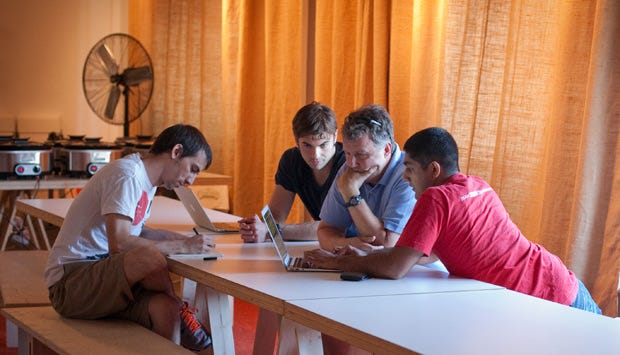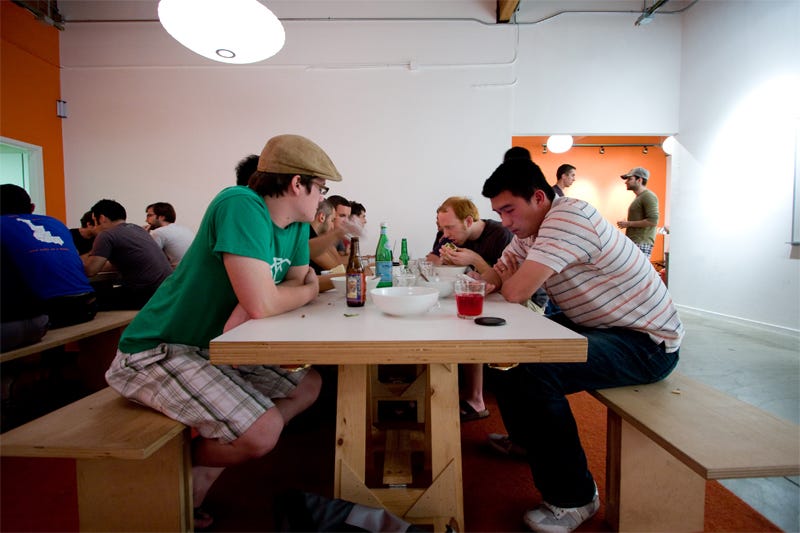Peer Learning is...
Y Combinator puts the learner in control
Startups are one of the best places to observe new knowledge being put to use. On top of figuring out a new product and how to sell it to a new market, startup founders face the pressure of growing quickly, often needing to raise investment money in order to accelerate their spending, while the threat of bankruptcy is always around the corner.
Startup accelerators are support programs that support batches of startups with a goal of helping them get an investment that would normally take a year or two. Startup accelerators aim to get them there in 3 months instead.
The world leader in startup accelerators is Y Combinator. Originally based in Boston, and now Silicon Valley, its startup alumni include Reddit, AirBnb and Dropbox.
Known as just "YC" among startup founders around the world, it's usually mentioned with legendary reverence.
Y Combinator set the model for the proliferation of thousands of copycat startups accelerators. But it still outperforms all of them. Ten years after it started, it's portfolio companies had gone on to raise almost $30 billion USD.
Most accelerator directors are aware of Y Combinator, but if you ask them why their program is 3 months long, or why 3 months is the default in the industry, they probably won't know.
Paul Graham, one of the founding partners of YC explains:
"We decided very early that the first thing we'd do would be to fund a bunch of startups over the coming summer. But we didn't realize initially that this would be the way we'd do all our investing. The reason we began by funding a bunch of startups at once was not that we thought it would be a better way to fund startups, but simply because we wanted to learn how to be angel investors, and a summer program for undergrads seemed the fastest way to do it. No one takes summer jobs that seriously. The opportunity cost for a bunch of undergrads to spend a summer working on startups was low enough that we wouldn't feel guilty encouraging them to do it."
YC started with $200,000 of the founders' money. It launched as a 3-month long program, because that was the length of the summer break at university.
Most accelerators inadvertently copy this and many other aspects of YC without understanding why, or challenging whether or not this design decision applies to their context or goals.
The proliferation of accelerators started two years later, around 2007, when the Techstars accelerator was founded. Techstars was also 3 months long, but instead of YC's fortnightly mentoring conversations with the fund partners and a weekly dinner talks, Techstars had a different approach. They introduced an intensive workshop curriculum and "mentoring days" full of 30-minute round-robin talks with volunteer business advisors.

While YC eventually focused on 2 programs per year in Silicon Valley, Techstars propagated across US cities, and opened it's playbook to others. So the Techstars model propagated around the world as the default accelerator model.
Most accelerator directors aren't aware of these origins, and execute the default schedule of heavy workshops and lectures in their programs.
But at YC, the startup founders are far more in control of their time. They're expected to attend the weekly dinner talk, but that serves less as a business school lecture and more as place for founders to share progress with each other.

We encourage founders to treat each dinner as a mini Demo Day and to show each other and us what they’ve built that week. We’ve found these weekly deadlines tend to push people to finish things in order to show them off.
The speaker usually shows up before 7 and talks informally with the founders before dinner. The actual talk happens over dessert. Most speakers are successful startup founders, and the talks are usually about the inside story of what happened in their startup(s). Talks are strictly off the record to encourage candor, because the inside story of most startups is more colorful than the one presented later to the public. Because YC has been around so long and we have personal relationships with most of the speakers, they trust that what they say won’t get out and tell us a lot of medium-secret stuff.
It's more of a competitive atmosphere, where founders feel peer pressure to show significant progress every week. The backdrop of that is the talk from an industry heavyweight, providing positive inspiration, some insider insight, and a contrast to their early-stage progress.
Most of the critical education happens in one-on-one conversations with a fund partner. They help assess progress, and respond to the founders current challenges with introductions to other founders or high-level experts who can address these needs with their own experience.
Every week, the founders are expected to aim for leaps and bounds, working hard on their business to show significant progress and adjustment from the week before. It’s a lot of pressure, but their time is their own. YC knows they’re talented and self-driven, so they have agency to decide what to do.
Whatever stage a startup is at when they arrive, our goal is to help them to be in dramatically better shape 3 months later. For most startups, better shape translates into two things: to have a better product with more users, and to have more options for raising money.
You can’t make people something they’re not, but the right conditions can bring out the best in them. And since most people have way more potential than they realize, they’re often surprised what they’re capable of.
Y Combinator realised that instinct to teach more leads to one-way information overload and away from the desired effect.
The true mark of success is when the learner evolves.
